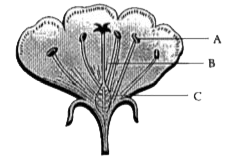When an insect sits on the flower of a plant then some particles A present in the top of little staks in flower attach to its body hair. When this insect now sits on the flower of another similar plant, then particles A attached to the hair of insect are put on the top of a flask-shaped organ at the centre of flower. The particle A grows a long tube B from the top of flask-shaped organ through which moves down and reaches the bottom part of flask-shaped organ. Here C fuses with the nucleus of D contained in structure E. The fusion of C and D forms a new cell F which grows and develops into a seed of the plant.
Name D and E.
Step-by-Step Solution:
1. Understanding the Process of Pollination:
- When an insect visits a flower, it collects pollen grains (particle A) from the anther, which is part of the stamen. This pollen attaches to the insect's body hair.
2. Transfer of Pollen:
- As the insect moves to another flower of the same species, the pollen grains attached to its body are transferred to the stigma of the carpel of the new flower.
3. Formation of the Pollen Tube:
- Once the pollen grains land on the stigma, they germinate and grow a long tube (tube B) called the pollen tube. This tube extends down through the style to reach the ovary at the base of the carpel.
4. Fusion of Gametes:
- Inside the ovary, the pollen tube releases male gametes (C) which travel down the tube to fuse with the female gamete (D). The female gamete is located within the ovule (E).
5. Formation of the Zygote:
- The fusion of the male gamete (C) and the female gamete (D) results in the formation of a new cell (F), which is called the zygote. This zygote will eventually develop into a seed.
6. Identifying D and E:
- In this context, D represents the female gamete, and E represents the ovule where the female gamete is located.
Final Answer:
- D: Female gamete
- E: Ovule
---
- When an insect visits a flower, it collects pollen grains (particle A) from the anther, which is part of the stamen. This pollen attaches to the insect's body hair.
- As the insect moves to another flower of the same species, the pollen grains attached to its body are transferred to the stigma of the carpel of the new flower.
- Once the pollen grains land on the stigma, they germinate and grow a long tube (tube B) called the pollen tube. This tube extends down through the style to reach the ovary at the base of the carpel.
- Inside the ovary, the pollen tube releases male gametes (C) which travel down the tube to fuse with the female gamete (D). The female gamete is located within the ovule (E).
- The fusion of the male gamete (C) and the female gamete (D) results in the formation of a new cell (F), which is called the zygote. This zygote will eventually develop into a seed.
- In this context, D represents the female gamete, and E represents the ovule where the female gamete is located.
- D: Female gamete
- E: Ovule
Topper's Solved these Questions
- HOW DO ORGANISM REPRODUCEBOOK - BETOPPERSCHAPTER - HOW DO ORGANISM REPRODUCEEXERCISE - WORKSHEET 3
67 Videos
- HEREDITY & EVOLUTIONBOOK - BETOPPERSCHAPTER - HEREDITY & EVOLUTIONEXERCISE - COMPETITIVE WORKSHEET
34 Videos
- LIFE PROCESSESBOOK - BETOPPERSCHAPTER - LIFE PROCESSESEXERCISE - COMPETITIVE WORKSHEET
82 Videos
Similar Questions
The given diagram represent the structure of a flower. Study the structure

When an insect sits on the flower of a plant then some particles from the little stalks in the flowers sticks to its body and when this insect sits on the flower of another plant, the particles get deposited in that flower. What are these particles?
View SolutionWrite the characters of insect pollinated flowers .
View Solution
Knowledge Check
Pollen grains insect pollinated flowers are
ASmooth and stickyBSmooth and roughCRough and dryDRough and sticky.In a flowering plant the pollen tube first arrivs in
AeggBan antipodal cellCa synergidDcentral cellNight blooming flowers attract pollinating insects with the help of
AAromaBNectarCEdible pollenDAll the above.
Insect pollinated flowers are known as:
View SolutionThe flask-shaped organ X at the centre of a flower is surrounded by a number of little stalks Y having swollen tops which lie just inside the ring of petals.
What does the swollen top of organ Y contain ?
View SolutionWhen pollen of a flower is transferred to the stigma of another flower of the same plant the pollination is referred to as
View SolutionWhen pollen grains of a flower are transferred to stigma of another flower of a different plant, the process is called
View SolutionInsect pollinated flowers usually possess
View Solution
